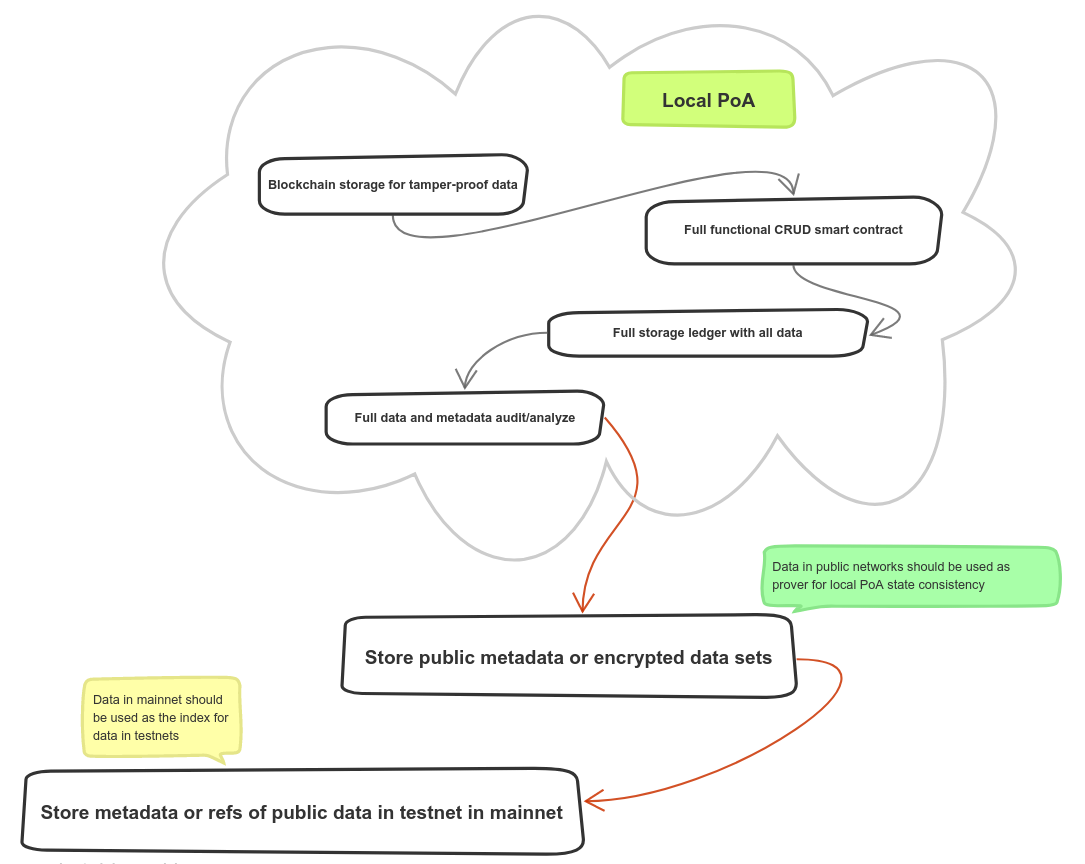Pheix as multi network gateway
13, July 2021
The idea is to select the primary storage network and populate records to other networks as the metadata or encrypted data parts. This is yet another one Pheix application: multi Ethereum network gateway.
Abstract
Ethereum blockchain could be much more decentralized if we will use the mix of main net, public test nets and private nets. Such method makes it possible to increase the resilience of our distributed application against network attacks or their natural degradation.
By the way, when we use the mix of private and public nets, we also get the additional data access level: sensitive data is stored only on private net and open data — on public net. This approach is quite good for third-party audit or tracing.
To manage data in this heterogeneous environment we need data relays (or routers) providing transparent data flows from one net to another. Actually the private net is the basic one: we have full access to it, we can store as much data as we want and we can make it quite fast — just by deploying to muscle servers or high performance cloud.
At middle layer we have a few official Ethereum test nets, they are quite close to private net, but at least x2 slower due to distributed and decentralized nature. We should use them to store meta data: specific headers, checksums or any details that could be useful for private net data inspection or restore. The general approach for data storing on tests nets is mixing and shaking: data should look (and actually be) chaotic, random and inconsistent.
The top layer: the Ethereum main net. It's non-free, so we should store as less data as we can just to make overall system cheaper. The idea is to store references (pointers) to data from test nets. Via these refs we can retrieve the relevant meta data sequence from test nets and trace or audit initial private net data.
We will try Pheix as relay for Ethereum networks, it's completely inspired and driven by Raku.
Sample data model
Benefits
The major benefit of this service: we have an integration entity for local PoA, testnets and mainnet. The important thing is ability to audit and analyze tamper-proof data from local PoA network without any granted access to it. This could be done with inspection of:
- refs (consistency) on mainnet;
- data (consistency) on test nets;
- metadata or encrypted data (audit/analyze) on testnets.
Reverse data engineering on mainnet indexes
Main net indexes could be used for retrieving data from test nets. The questions:
- ok, we can store anything we want on test net, it's free - but how we can guarantee that stored data is covering the data set in local PoA network (spoiler: store CRC for local PoA data sets)?
- what's about encryption? Interesting thing: is we suppose this service as data relay/router, it could be the service for retrieving data from both local and public networks, so we can store public keys in local PoA transactions and use them for linked data decryption (in test network).
- regarding previous question: if private key(s) will be leaked, what should we do? Encrypted data self destruction or whatever?
- the generic question: how will the auditor prove that local PoA state is valid on mainnet/testnet data?
Automatic data update
User account uses the next ETH addreses:
- Local PoA network addrs as local;
- Public testnet addrs (Goerli, Kovan, whatever) as interim (we can handle a few interim addrs — for each test network);
- Public main net addrs as main.
All user activity is inside Local PoA network. So service API provides access to local PoA network. By the way user set sync points, where data from local PoA network syncs with test net(s) and mainnet automatically.
By the way, service should subscribe to events from private net (it's simple, 'cause we have full access to local PoA network node) and populate event meta data to public test nets and main net on demand. Detailed info about how subscriptions works: https://geth.ethereum.org/docs/rpc/pubsub.
It looks clear, but we should have Pheix subscription process alive (maybe as daemon or service). Also we should have a monitor and simple statistics dumper/analyzer. I suppose generic CRUD smart contract on local PoA and test nets. On mainnet we will use light version of generic CRUD smart contract: we will store just indexes and short metadata of testnet(s) records.
Credits
Service specification draft
Talk/presentation workspace
Talk at Perl & Raku converence in the Cloud 2021, slides, annonce
Talk at The Raku Conference 2021
 narkhov.pro
narkhov.pro